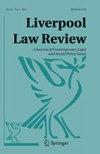The Rationing of Essential Resources in Times of Crisis: Logan’s Run and the ‘Science-fictional’ Right to Life Under Article 2 of the ECHR
IF 0.3
Q3 LAW
引用次数: 0
Abstract
Abstract We argue that the right to life—for example under Article 2 of the European Convention—has become an increasingly fragile thing, prone to sharp rationing by domestic law and policy makers, almost to the extent seen in certain works of dystopian science fiction. The near-future novel ‘Logan’s Run ’ (1967) depicts a brutally austere regime, that is ‘justified’ in law on the basis that finite, scarcening resources must somehow be preserved, to enable survival. Over—population means that human rights are now fictive however—there are neither family life rights nor privacy rights, and human dignity is in short supply. An all-powerful AI ‘being’ governs via algorithms to ration and curtail lifespans, so that no one is allowed to be older than 21. This rule is enforced via ‘voluntary’ submission to euthanasia, and the intervention of a murderous militia for those who do not comply. As ever, patriotic behaviour is key. Arguably, not dissimilar crisis thinking was seen during the pandemic, with various resources diverted or triaged towards the worthiest citizens—those with the best chances of survival—through the use of such things as ‘frailty algorithms.’ Recent UK case law is then analysed to gauge the extent to which dystopian reasoning might be encroaching upon the effectiveness of human rights protections, post-pandemic.危机时期基本资源的配给:《欧洲人权公约》第2条下洛根的逃跑和“科幻”生命权
我们认为,生命权——例如《欧洲公约》第2条规定的生命权——已经变得越来越脆弱,容易受到国内法律和政策制定者的严格限制,其程度几乎与某些反乌托邦科幻作品中的情况如出一辙。近未来小说《洛根的逃亡》(Logan’s Run, 1967)描绘了一个残酷的严厉政权,在法律上是“合理的”,因为有限的、稀缺的资源必须以某种方式得到保护,才能生存。然而,人口过剩意味着人权现在是有效的——既没有家庭生命权,也没有隐私权,人的尊严是缺乏的。一个全能的人工智能“存在”通过算法来控制和缩短寿命,这样任何人都不允许超过21岁。这条规则是通过“自愿”服从安乐死来执行的,对于那些不服从的人,凶残的民兵会进行干预。一如既往,爱国行为是关键。可以说,在流感大流行期间,人们也看到了类似的危机思维,通过使用“脆弱算法”等方法,各种资源被转移或分流到最有价值的公民身上——那些最有生存机会的公民。然后分析英国最近的判例法,以衡量反乌托邦推理在多大程度上侵犯了大流行后人权保护的有效性。
本文章由计算机程序翻译,如有差异,请以英文原文为准。
求助全文
约1分钟内获得全文
求助全文
来源期刊

Liverpool Law Review
LAW-
CiteScore
1.40
自引率
10.00%
发文量
24
期刊介绍:
The Liverpool Law Review is a tri-annual journal of contemporary domestic, European and international legal and social policy issues. The Journal aims to provide articles, commentaries and reviews across a wide range of theoretical and practical legal and social policy matters - including public law, private law, civil and criminal justice, international law, ethics and legal theory. The Journal has many international subscribers and regularly publishes important contributions from the U.K. and abroad. Articles and commentaries are published with sufficient speed to ensure that they are truly current.
 求助内容:
求助内容: 应助结果提醒方式:
应助结果提醒方式:


